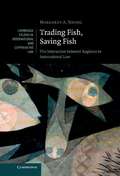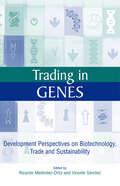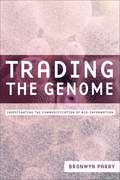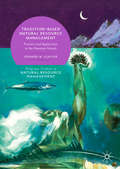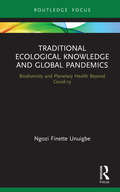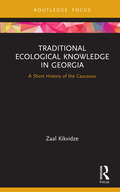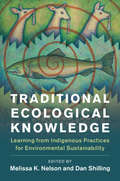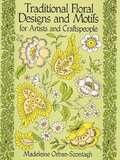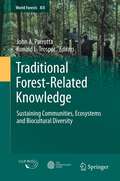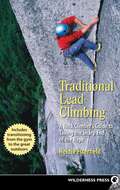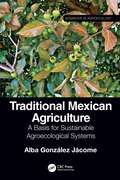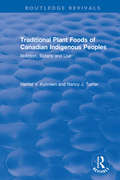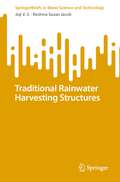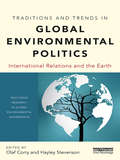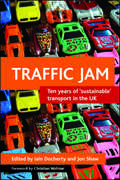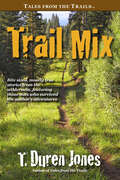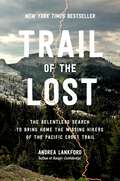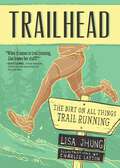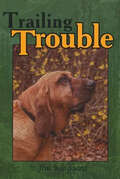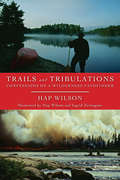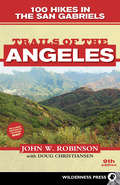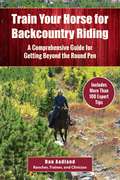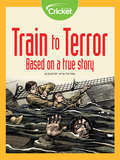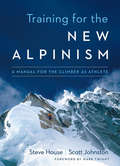- Table View
- List View
Trading Fish, Saving Fish
by Margaret A. YoungNumerous international legal regimes now seek to address the global depletion of fish stocks, and increasingly their activities overlap. The relevant laws were developed at different times by different groups of states. They are motivated by divergent economic approaches, influenced by disparate non-state actors, and implemented by separate institutions such as the World Trade Organisation and the United Nations Food and Agriculture Organisation. Margaret Young shows how these and other factors affect the interaction between regimes. Her empirical and doctrinal analysis moves beyond the discussion of conflicting norms that has dominated the fragmentation debate. Case-studies include the negotiation of new rules on fisheries subsidies, the restriction of trade in endangered marine species and the adjudication of fisheries import bans. She explores how regimes should interact, in fisheries governance and beyond, to offer insights into the practice and legitimacy of regime interaction in international law.
Trading in Genes: Development Perspectives on Biotechnology, Trade and Sustainability
by Ricardo Meléndez Vicente SánchezFew scientific developments have given rise to as much controversy as biotechnology. Numerous groups are united in their opposition, expressing concern over environmental and health risks, impacts on rural livelihoods, the economic dominance of multinational companies and the ethical implications of crossing species boundaries. Among the supporters of the technology are those that believe in its potential to enhance food security, further economic development, increase productivity and reduce environmental pressures. As a result, countries - and sectors within countries - find themselves at odds with each other while potential opportunities for development offered by the use of biotechnology are seized or missed, and related risks go unmanaged. This book, a unique interdisciplinary collection of perspectives from the developing world, examines the ongoing debate. Writing for the International Centre for Trade and Sustainable Development, leading experts address issues such as diffusion of technology, intellectual property rights, the Cartagena Protocol, impacts of international trade, capacity building and biotechnology research and regulation. With the most recent and relevant examples from around the world, Trading in Genes offers the reader a single-volume overview of the connections between biotechnology, trade and sustainability that is both wide-ranging and thorough
Trading the Genome: Investigating the Commodification of Bio-Information
by Bronwyn ParryIn a groundbreaking work that draws on anthropology, history, philosophy, business and law, Parry links firsthand knowledge of the operation of the bioprospecting industry to a sophisticated analysis of broader economic, regulatory, and technological transformations to reveal the complex economic and political dynamics that underpin the new global trade in bio-information.
Tradition-Based Natural Resource Management: Practice and Application in the Hawaiian Islands (Palgrave Studies in Natural Resource Management)
by Edward W. GlazierThis book addresses the complex socio-political context of natural resource management in coastal and marine environments throughout the contemporary Pacific Islands and provides lessons that can be applied around the globe. The author spotlights one particular case in which Native Hawaiians worked successfully to develop a formal policy mechanism through which to advise government agencies in the State of Hawaii on matters regarding traditional and customary use and management of the island’s natural resources. Glazier describes historic-traditional aspects of natural resource use and management in the Hawaiian Islands and the challenging process that was employed to enhance the capacity of modern Hawaiians to influence the course of their future. This process successfully broached and addressed truly difficult challenges, including but not limited to: the convening of representatives of a complex society of indigenous persons in order to elicit traditional place-based knowledge and varying perspectives on the appropriate use and management of natural resources; the incorporation of such knowledge and perspectives into the modern natural resource management and policy context; and the need to balance the interests of indigenous persons and those of more recently-arriving persons around the island chain. The lessons learned were many and varied and are particularly germane for resource managers, scientists, policymakers, and indigenous persons seeking to undertake balanced natural resource policy decisions in island, coastal, and indigenous settings around the Pacific and beyond.
Traditional Ecological Knowledge and Global Pandemics: Biodiversity and Planetary Health Beyond Covid-19 (Routledge Focus on Environment and Sustainability)
by Ngozi Finette UnuigbeThis book demonstrates the importance and potential role of Traditional Ecological Knowledge in foreseeing and curbing future global pandemics. The reduction of species diversity has increased the risk of global pandemics and it is therefore not only imperative to articulate and disseminate knowledge on the linkages between human activities and the transmission of viruses to humans, but also to create policy pathways for operationalizing that knowledge to help solve future problems. Although this book has been prompted by the COVID-19 pandemic, it lays a policy foundation for the effective management or possible prevention of similar pandemics in the future. One effective way of establishing this linkage with a view to promoting planet health is by understanding the traditional ecological knowledge of indigenous peoples with a view to demonstrating the significant impact it has on keeping nature intact. This book argues for the deployment of traditional ecological knowledge for land use management in the preservation of biodiversity as a means for effectively managing the transmission of viruses from animals to humans and ensuring planetary health. The book is not projecting traditional ecological knowledge as a panacea to pandemics but rather accentuating its critical role in the effective mitigation of future pandemics. This book will be of great interest to students and scholars of traditional ecological knowledge, indigenous studies, animal ecology, environmental ethics and environmental studies more broadly.
Traditional Ecological Knowledge in Georgia: A Short History of the Caucasus (Routledge Focus on Environment and Sustainability)
by Zaal KikvidzeThis multidisciplinary book develops a synthesis of traditional ecological knowledge in the Caucasus region in Georgia – a hotspot of natural and cultural diversity. Traditional ecological knowledge connects the knowledge of natural phenomena with the culture of a given human society, and Georgia is an excellent case study for observing this knowledge. The Caucasus region in particular is notable for its natural and ethnocultural diversity and this book weaves together the disciplines of history, environment and ethnography to develop a synthesis of traditional ecological knowledge. Tracing the history of Georgia through two main phases, the hunter and gatherer bands and the agrarian phase, the author examines important events such as the breeding of naked hexaploid wheat, the domestication of the grapevine and the development of viticulture. By utilising this historic perspective it allows us to clearly see how traditional ecological knowledge has increased in sophistication during the long prehistory of Georgia, and most importantly how this type of knowledge underpins the social and economic progress of traditional societies, not only in Georgia, but throughout the world. This book will be of great relevance to interdisciplinary-minded scholars and students who have an interest in the relationships between nature and human society, including anthropologists, historians, biologists, ecologists, botanists, sociologists and ethnographers.
Traditional Ecological Knowledge: Learning from Indigenous Practices for Environmental Sustainability (New Directions in Sustainability and Society)
by Melissa K. Nelson Daniel ShillingThis book examines the importance of Traditional Ecological Knowledge (TEK) and how it can provide models for a time-tested form of sustainability needed in the world today. The essays, written by a team of scholars from diverse disciplinary backgrounds, explore TEK through compelling cases of environmental sustainability from multiple tribal and geographic locations in North America and beyond. Addressing the philosophical issues concerning indigenous and ecological knowledge production and maintenance, they focus on how environmental values and ethics are applied to the uses of land. Grounded in an understanding of the profound relationship between biological and cultural diversity, this book defines, interrogates, and problematizes, the many definitions of traditional ecological knowledge and sustainability. It includes a holistic and broad disciplinary approach to sustainability, including language, art, and ceremony, as critical ways to maintain healthy human-environment relations.
Traditional Floral Designs and Motifs for Artists and Craftspeople (Dover Pictorial Archive)
by Madeleine Orban-SzontaghRe-create a lovely spray of wild roses that once bloomed in abundance on an early nineteenth-century fabric. Duplicate a lush Persian floral print from a kerchief worn in the waning days of the acien régime. These and dozens of other superb royalty-free designs -- adapted from patterns on antique textiles -- are available now to artists and craftspeople in this attractive collection.A noted artist and surface designer has masterfully rendered nearly 230 designs from French, English, German, Swiss, and Russian textiles of the eighteenth and nineteenth centuries. Featured are profusions of flowers, leaves, sprays, branches, fruits, and birds in a wide variety of formats: clusters, bouquets, single vignettes, and more. Also shown are several full-page motifs with a single large, elaborate flower. Captions supply a brief description, date, and place of origin for the designs on each page.Among the many charming samples are floral and butterfly blockprints from Alsace in France (c. 1790), a Kashmir floral motif from England (1805), an English rose bouquet (1834), berries and flowers from Switzerland (1820), and scores of others.
Traditional Forest-Related Knowledge
by John A. Parrotta Ronald L. TrosperExploring a topic of vital and ongoing importance, Traditional Forest Knowledge examines the history, current status and trends in the development and application of traditional forest knowledge by local and indigenous communities worldwide. It considers the interplay between traditional beliefs and practices and formal forest science and interrogates the often uneasy relationship between these different knowledge systems. The contents also highlight efforts to conserve and promote traditional forest management practices that balance the environmental, economic and social objectives of forest management. It places these efforts in the context of recent trends towards the devolution of forest management authority in many parts of the world. The book includes regional chapters covering North America, South America, Africa, Europe, Asia and the Australia-Pacific region. As well as relating the general factors mentioned above to these specific areas, these chapters cover issues of special regional significance, such as the importance of traditional knowledge and practices for food security, economic development and cultural identity. Other chapters examine topics ranging from key policy issues to the significant programs of regional and international organisations, and from research ethics and best practices for scientific study of traditional knowledge to the adaptation of traditional forest knowledge to climate change and globalisation.
Traditional Lead Climbing: A Rock Climber's Guide to Taking the Sharp End of the Rope
by Heidi PesterfieldTraditional Lead Climbing is the first and only guidebook intended to teach rock climbers how to lead with gear. <P><P>Unlike other types of climbing such as sport and direct-aid climbing, "trad" climbing relies on placing your own gear as you climb from the ground. It's also one of the more dangerous climbing activities, where expert guidance is a must. This invaluable guide gives step-by-step descriptions of equipment, rope management, and techniques. Dozens of close-up photos and fun yet informative drawings show situations climbers might encounter and how to deal with them. In addition to covering the basics, the book showcases the experience and wisdom of a number of world-class climbers in self-revealing sidebars.
Traditional Mexican Agriculture: A Basis for Sustainable Agroecological Systems (Advances in Agroecology)
by Alba González JácomeThis long-needed book highlights how traditional Mexican agriculture has changed according to environmental, climatic, geographical, social and cultural conditions. Grounded in archaeological-historical data from interrelated research of various scientific disciplines, the book also draws on studies made by anthropologists of varied small-scale agricultural groups. Traditional Mexican Agriculture is the result of a holistic study of Mexican agriculture. It offers the reader a perspective of traditional agriculture in Mexico from social, cultural and ecological Anthropology, Ethnology, regional and environmental History, and Agroecology, to help obtain sustainable agroecology where human societies obtain better ways of life and a healthy and nutritious food system. The book further aims to recover ideas, management, and components of local knowledge of small-scale farmers. Pitched at university students and academics, as well as researchers and developers of agricultural matters, this book will be ideal reading at agrarian universities and related institutions. It provides a basis for future studies in sustainable agricultural systems in this region.
Traditional Plant Foods of Canadian Indigenous Peoples: Nutrition, Botany and Use (Routledge Revivals)
by Harriet Kuhnlein Nancy J TurnerFirst published in 1991, Traditional Plant Foods of Canadian Indigenous Peoples details the nutritional properties, botanical characteristics and ethnic uses of a wide variety of traditional plant foods used by the Indigenous Peoples of Canada. Comprehensive and detailed, this volume explores both the technical use of plants and their cultural connections. It will be of interest to scholars from a variety of backgrounds, including Indigenous Peoples with their specific cultural worldviews; nutritionists and other health professionals who work with Indigenous Peoples and other rural people; other biologists, ethnologists, and organizations that address understanding of the resources of the natural world; and academic audiences from a variety of disciplines.
Traditional Rainwater Harvesting Structures (SpringerBriefs in Water Science and Technology)
by Joji V.S. Reshma Susan JacobThis book contains detailed information about the traditional rainwater structures. Harvesting rainwater is becoming as a practical adaptation strategy for urban areas that are vulnerable to climate alteration. In the past, rainwater harvesting was more significant than it is today. Studies show that a variety of traditional and age-old rainwater gathering techniques were created or put into use in reaction to earlier climate change incidents. According to history, both floods and droughts were frequent occurrences in ancient India. Perhaps this explains why each region of the nation has its own traditional water gathering practices that are representative of the local physical and cultural diversity. All of these methods can be seen as a concept of harvesting rain whenever and wherever it falls. Water makes up 70.9 % of the Earth's surface, mainly in the form of oceans and seas. Water is found in modest proportions as 1.7 % groundwater, 1.7 % glaciers and ice caps in Antarctica and Greenland, vapour, clouds (ice and liquid water suspended in air), and 0.001% precipitation in the air. Evaporation, transpiration, evapo-transpiration, condensation, precipitation, root absorption, percolation, infiltration, base flow and runoff are processes that water goes through on its way to the sea.
Traditions and Trends in Global Environmental Politics: International Relations and the Earth (Routledge Research in Global Environmental Governance)
by Hayley Stevenson Olaf CorryHow can a divided world share a single planet? As the environment rises ever higher on the global agenda, the discipline of International Relations (IR) is engaging in more varied and transformative ways than ever before to overcome environmental challenges. Focusing in particular on the key trends of the past 20 years, this volume explores the main developments in the global environmental crisis, with each chapter considering an environmental issue and an approach within IR. In the process, adjacent fields including energy politics, science and technology, and political economy are also touched on. Traditions and Trends in Global Environmental Politics is aimed at anybody interested in the key international environmental problems of the day, and those seeking clarification and inspiration in terms of approaches and theories that decode how the environment is accounted for in global politics. It will be an essential resource for students and scholars of global environmental politics and governance, environmental studies and IR.
Traffic jam: Ten years of 'sustainable' transport in the UK
by Iain Docherty and Jon ShawThis informed and lively book offers a timely analysis of the UK government's sustainable - or subsequently 'integrated' - transport policy 10 years after the publication of A New Deal for Transport: Better for Everyone. Written by prominent transport experts and with a foreword by Christian Wolmar, the book identifies the modest successes and, sadly, the far more significant failures in government policy over the last decade. The authors also uncover why it has proved so difficult to adopt a more sustainable approach to transport and break Britain's love-affair with the car. The book reviews the links between the idea of sustainability and transport policy, and provides an up-to-the-minute analysis of the political realities surrounding the delivery of a sustainable transport agenda in the UK. It picks up on the principal components of A New Deal for Transport and evaluates to what extent these have, or haven't, been delivered in England, Scotland, Wales and Northern Ireland. The contributors analyse why delivering sustainable transport policies seems to present particular difficulties to ministers across the UK, and considers the UK's experience in an international perspective. The book draws lessons from the last 10 years in order to better inform future policy development. Traffic Jam is an indispensable analysis of the difficulties involved in turning policy ideals into practical reality, and as such will be of interest to scholars, students, planners, policy analysts and policy makers.
Trail Mix: Bite sized, mostly true stories from the wilderness, featuring those who survived the author's adventures
by T. Duren JonesGoing hiking? Don&’t forget to pack these bite-sized, mostly true stories from the wilderness, featuring those who survived the author&’s adventures. T. Duren Jones loves hiking wilderness trails. He gets out as often as he can, and enjoys taking friends and family on his explorations. Most of those who have joined his adventures still talk to him. He has hiked hundreds of trails in the American West, has summited all of the fifty-four Colorado 14,000 ft. peaks (now on his second round with his granddaughter), and has trekked the nearly 500 miles of the Colorado Trail&’s twenty-eight segments from Denver to Durango. Once he&’s done with one checklist, he on to the next—this guy is nuts! This book is a follow-up to Tales from the Trails, this time with new stories presented in bite-sized pieces. Snack on a few at a time, but you might not want to put it down and end up eating, er, reading, the whole package in one sitting. As with his previous book, Trail Mix is part adventure, part travelogue, part motivational encouragement, part cautionary tale, and part stand-up comedy (at least the author thinks so). Trail Mix is for anyone who loves spending time in the outdoors, who wishes they could be outdoors more, or who simply enjoys reading about nuts who spend time in the great outdoors. The author hopes by sharing these adventures—and misadventures—that the readers will be inspired to go out and discover their own stories.
Trail of the Lost: The Relentless Search to Bring Home the Missing Hikers of the Pacific Crest Trail
by Andrea Lankford** THE INSTANT NEW YORK TIMES BESTSELLER ** ** CRIMECON'S "BOOK OF THE YEAR" (2024) ** ** AN AMAZON "BEST BOOKS OF THE MONTH" FOR AUGUST 2023 (Biographies & Memoirs) ** From an award-winning former law enforcement park ranger and investigator, this female-driven true crime adventure follows the author&’s quest to find missing hikers along the Pacific Crest Trail by pairing up with an eclectic group of unlikely allies. As a park ranger with the National Park Service's law enforcement team, Andrea Lankford led search and rescue missions in some of the most beautiful (and dangerous) landscapes across America, from Yosemite to the Grand Canyon. But though she had the support of the agency, Andrea grew frustrated with the service's bureaucratic idiosyncrasies, and left the force after twelve years. Two decades later, however, she stumbles across a mystery that pulls her right back where she left off: three young men have vanished from the Pacific Crest Trail, the 2,650-mile trek made famous by Cheryl Strayed's Wild, and no one has been able to find them. It&’s bugging the hell out of her. Andrea&’s concern soon leads her to a wild environment unlike any she&’s ever encountered: missing person Facebook groups. Andrea launches an investigation, joining forces with an eclectic team of amateurs who are determined to solve the cases by land and by screen: a mother of the missing, a retired pharmacy manager, and a mapmaker who monitors terrorist activity for the government. Together, they track the activities of kidnappers and murderers, investigate a cult, rescue a psychic in peril, cross paths with an unconventional scientist, and reunite an international fugitive with his family. Searching for the missing is a brutal psychological and physical test with the highest stakes, but eventually their hardships begin to bear strange fruits—ones that lead them to places and people they never saw coming. Beautifully written, heartfelt, and at times harrowing, TRAIL OF THE LOST paints a vivid picture of hiker culture and its complicated relationship with the ever-expanding online realm, all while exploring the power and limits of determination, generosity, and hope. It also offers a deep awe of the natural world, even as it unearths just how vast and treacherous it can be. On the TRAIL OF THE LOST, you may not find what you are looking for, but you will certainly find more than you seek.
Trailhead: The Dirt on All Things Trail Running
by Lisa JhungTrailhead is a witty, fun pocket guide to all things trail running. Veteran trail runner, triathlete, and adventure racer Lisa Jhung offers this illustrated guide to all runners curious about running off road or wanting to run farther into the backcountry. She offers authoritative advice on everything from how to find good trails to run, how to choose the best shoes and clothing, how to carry enough water, and how to stay safe from wildlife and weather. Trailhead includes: The allure: Why trail running is good for body and mind The essentials: Finding good trails, choosing the best trail running gear, handling trail and weather conditions, what you need to know about nutrition and hydration Safety: How to treat (and avoid) common trail running injuries, first aid, animal safety Etiquette: Right of way, preserving the trail, when nature calls Company: Running alone, with friends, with dogs--or burros! Stronger, faster: At-home exercises to enhance your running Going long: Preparing for longer trail runs or trail races Trailhead is a smart, entertaining read as well as a thorough resource for everyone from aspiring trail runners to those looking to get the most out of every trail run, whether in a city park or on a mountain adventure.
Trailing Trouble
by Jim KjelgaardYoung game warden Tom Rainse had two prized possessions: a pinto pony, and Smoky, the dog with a bloodhound's "nose for trouble:' When the pinto was stolen, Tom put Smoky on the trail, only to find that it led them straight into a baffling wilderness mystery. Who was the rustler, and what lay behind the theft? Buck Brunt, Tom's fellow game warden, thought it was poaching. Tom himself was sure that it was something bigger. But Smoky's nose was what finally found the answer. This outdoor adventure-mystery is an independent sequel to A Nose for Trouble. Like the earlier book, it has a strong conservation theme, and all of Jim Kjelgaard's first-hand understanding of animal nature and wilderness ways.
Trails and Tribulations: Confessions of a Wilderness Pathfinder
by Hap Wilson Ingrid ZschognerIn an age when "survival" shows permeate the media, noted northern traveller Hap Wilson shares accounts of his lifelong involvement with wilderness living within the Canadian Shield. Wilson knows better than most how to live in the woods. As park ranger, canoe guide, outfitter, trail builder, and environmental activist, he learned from firsthand experience that nature can neither be beaten or tamed. Trails and Tribulations takes the reader on a journey with the author through natural settings ranging from austere to mysterious and breathtaking. Contents include animal attacks, bush fires, the threat of hypothermia, and vision-quest sites, to name but a few.
Trails for the Twenty-First Century: Planning, Design, and Management Manual for Multi-Use Trails
by Kristine Olka Robert Rails to Trails Conservancy Charles Flink David Burwell Robert SearnsCommunities across the country are working to convert unused railway and canal corridors into trails for pedestrians, cyclists, horseback riders, and others, serving the needs of both recreationists and commuters alike. These multi-use trails can play a key role in improving livability, as they offer an innovative means of addressing sprawl, revitalizing urban areas, and reusing degraded lands. Trails for the Twenty-First Century is a step-by-step guide to all aspects of the planning, design, and management of multi-use trails. Originally published in 1993, this completely revised and updated edition offers a wealth of new information including. *discussions of recent regulations and federal programs, including ADA and TEA-21 *recently revised design standards from AASHTO *current research on topics ranging from trail surfacing to conflict resolution *information about designing and building trails in brownfields and other *environmentally troubled landscapes Also included is a new introduction that describes the importance of rail-trails to the sustainable communities movement, and an expanded discussion of maintenance costs. Enhanced with a wealth of illustrations, Trails for the Twenty-First Century provides detailed guidance on topics such as: taking a physical inventory and assessment of a site; involving the public and meeting the needs of adjacent landowners; understanding and complying with existing legislation; designing, managing, and promoting a trail; and where to go for more information. It is the only comprehensive guidebook available for planners, landscape architects, local officials, and community activists interested in creating a multi-use trail.
Trails of the Angeles
by John W. Robinson Doug ChristiansenThe rugged San Gabriel Mountains, rising starkly from the edge of the Los Angeles Basin, provide a sharp contrast to the hustle and bustle of the city and its surroundings. Angelinos across the county (a population of almost 10 million), as well as visitors from out of state, welcome the opportunity to escape from city chaos into the quiet wilderness.This 9th edition of the classic Wilderness Press guide has been revised and updated to reflect recent trail changes, and now includes trips in the Fish Canyon Narrows, along Alder Creek, and to Jones Peak, as well as perennial favorites such as Old Baldy, Mt. Wilson, and Devils Punchbowl. Each detailed trip description notes the distance, difficulty, and ideal season, and points out the highlights of the trail. The guide includes a companion 4-color waterproof topo map.
Train Your Horse for the Backcountry: A Comprehensive Guide for Getting Beyond the Round Pen
by Dan AadlandMany clinicians offer strong instruction in building a relationship with the horse but too often exclude safety concerns and teaching the skills necessary for safe and fulfilling use in the backcountry. They don?t show students how to tie up a horse?s foot should you have to restrain him to pull porcupine quills, and they don?t teach basic knots and hitches. Enter Dan Aadland, a seasoned equestrian and breeder who shares expertise gained from riding backroads and teaching clinics. Aadland first teaches students to understand the natural impulses of the horse and how to stay safe, a method he calls ?survival horsemanship.? He then moves on to training both horse and rider in the basics of trail riding, including saddling, mounting with control, trail savvy, types of trails and obstacles, domestic and wild animal encounters, and staying cool in stressful situations. Other helpful topics covered include:Essential neck rein skills Elementary packing A mule primer Safe trailering Low-impact trail riding And much more! With Beyond the Round Pen, riders will be ready for safe backcountry exploring in no time.
Train to Terror: Based on a True Story
by David HillIn 1953, Boy Scouts aboard a passenger train in New Zealand face death when a bridge over a river is washed out. This true story depicts the Tangiwai disaster and how one boy’s quick thinking helps to save friends and passengers. The tragedy resulted in early warning systems on Mount Rauapehu to alert travelers to potential danger.
Training for the New Alpinism
by Steve House Scott Johnston Mark TwightIn Training for the New Alpinism, Steve House, world-class climber and Patagonia ambassador, and Scott Johnston, coach of U.S. National Champions and World Cup Nordic Skiers, translate training theory into practice to allow you to coach yourself to any mountaineering goal. Applying training practices from other endurance sports, House and Johnston demonstrate that following a carefully designed regimen is as effective for alpinism as it is for any other endurance sport and leads to better performance. They deliver detailed instruction on how to plan and execute training tailored to your individual circumstances. Whether you work as a banker or a mountain guide, live in the city or the country, are an ice climber, a mountaineer heading to Denali, or a veteran of 8,000-meter peaks, your understanding of how to achieve your goals grows exponentially as you work with this book. Chapters cover endurance and strength training theory and methodology, application and planning, nutrition, altitude, mental fitness, and assessing your goals and your strengths. Chapters are augmented with inspiring essays by world-renowned climbers, including Ueli Steck, Mark Twight, Peter Habeler, Voytek Kurtyka, and Will Gadd. Filled with photos, graphs, and illustrations.
